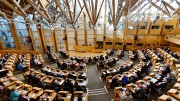The impending end of rent control legislation in Scotland is being welcomed by industry experts, with hopes that it could encourage new investment in the private rental sector. The move could offer much-needed stability for landlords, who have faced uncertainty under the government’s previous policies.
Rent controls scrapped, opening market opportunities
Scottish Housing Minister Paul McLennan confirmed that the temporary rent control legislation will end on 31 March 2025. “The temporary changes to rent adjudication were in place to support the transition away from the short-term rent cap that was in place under the Cost-of-Living Act,” McLennan told *The Herald*. “They were in place for a year to manage the risk of very steep increases in rents for tenants if there was a return to market rent in a single step and will come to an end on 31 March 2025.”
Despite confirming that the government is considering longer-term rent controls where necessary, many landlords see this as a crucial turning point for the market.
Investor confidence set to rise
David J Alexander, Chief Executive of DJ Alexander Scotland Ltd, believes the decision will encourage new investment in the sector. “Everybody involved in the private rented sector (PRS) has been frustrated at the uncertainty of the Scottish Government’s policy on rent controls,” he said. “But this announcement, coupled with a proposed consultation including consideration of how new housing built specifically for private rent – including in mid-market rent and other purpose-built private rented accommodation – should be treated, is to be welcomed.”
He added that the removal of rent caps, at least until the Housing (Scotland) Bill takes effect in 2027, provides landlords and investors with a degree of certainty that has been lacking in recent years. “This should encourage a return of investment in the sector and the potential for a rapid increase in the number of new homes being built for the private rented sector. This is a positive development for landlords, investors, and tenants who will all benefit from an increase in the volume of properties being brought into the market.”
Positive outlook for landlords and tenants
The move is expected to stabilise the market and encourage a surge in new rental property developments, helping to meet high tenant demand. “Open market rent setting can return with no rent cap restriction,” Alexander continued. “This will be a comfort for landlords and investors who now have a greater degree of certainty for the next few years.”
Industry experts believe that restoring landlord confidence is key to addressing the shortage of rental homes in Scotland. By enabling rental yields to adjust to market conditions, landlords may be more willing to expand their portfolios, ultimately benefiting tenants by increasing supply and moderating price rises.
Alexander concluded: “This is a very positive development and is a clear sign that the Scottish Government is listening to the private rented sector and going some way to encourage growth. Ensuring landlords and investors see the sector as viable will result in a more stable market and a greater availability of rental homes for tenants in Scotland.”








